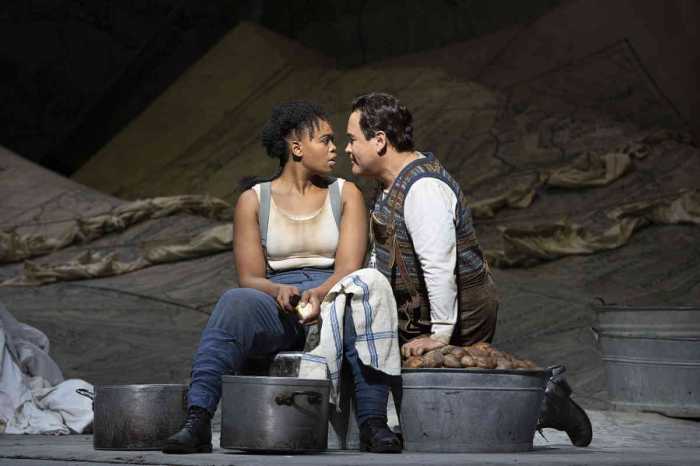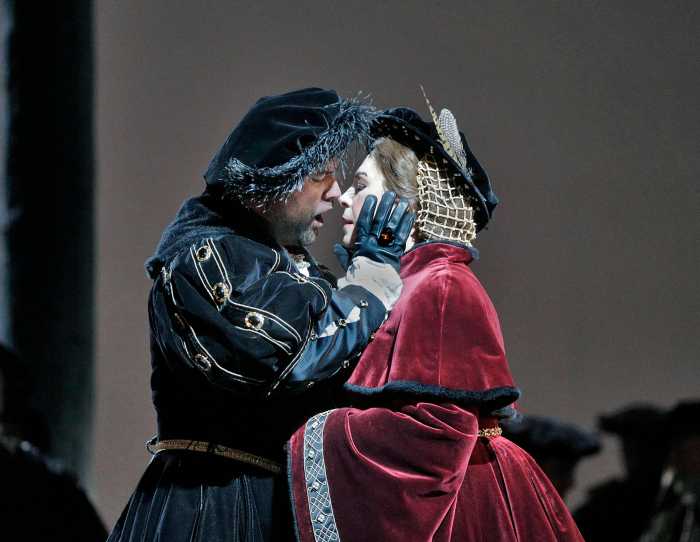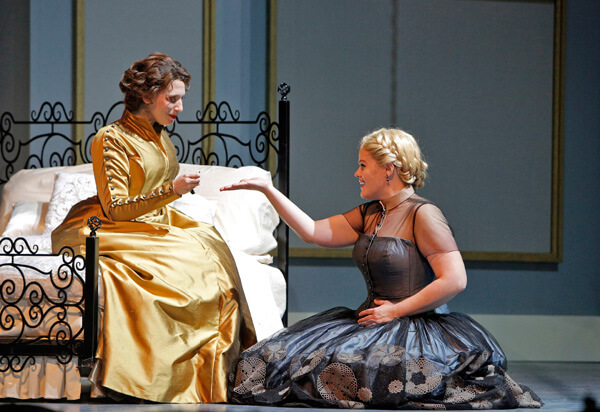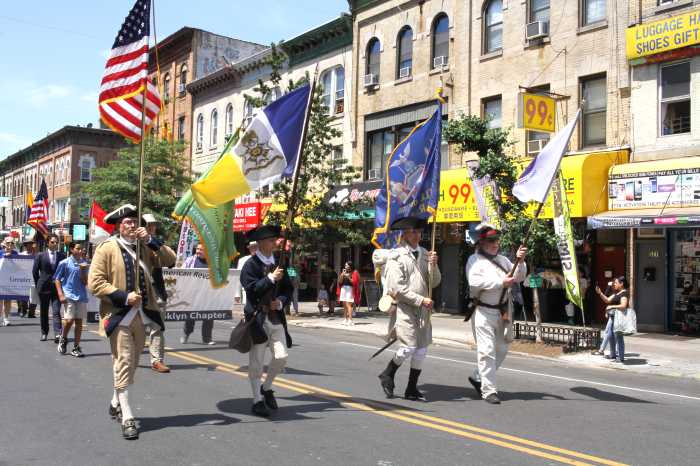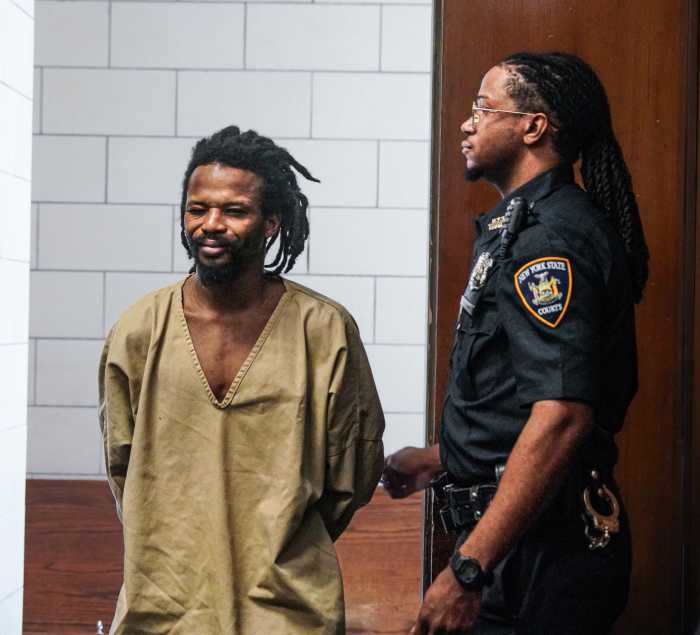Gerald Finley and Bryan Hymel in Pierre Audi’s production of “Guillaume Tell” at the Met. | MARTY SOHL/ METROPOLITAN OPERA
BY ELI JACOBSON | At its premiere at the Paris Opéra in 1829, Gioachino Rossini’s “Guillaume Tell” (“William Tell”) created a revolution that influenced Verdi, Donizetti, Berlioz, Meyerbeer, and Wagner, changing the course of opera in the 19th century. It was the final opera of Rossini’s career — he retired at age 37. “Tell” has always been an opera more talked about or read about than seen or heard. The Metropolitan Opera hasn’t presented it since 1931, when it was given as “Guglielmo Tell” in a bowdlerized Italian translation. Last month, the Met presented it for the first time in the original French.
Alas, the production by Pierre Audi (a co-production with the Dutch National Opera) is a bewildering, lifeless exercise in stylization without style or point. George Tsypin’s cavernous set resembles the valley of a glacier filled with paper maché rocks, deer suspended upside down from the ceiling, and a boat frame/ wooden bridge structure spanning the upper part of the stage. Forty-foot-high fluorescent light bulbs represent trees.
The costumes by Andrea Schmidt-Futterer feature a mélange of styles and periods. The Swiss are costumed all in white because they are good, the Austrian occupiers all in black because they are bad. Tell is dressed as old Moses in “The Ten Commandments,” the other men in the de rigueur long 19th century overcoats. The conflicted Hapsburg princess Mathilde models a smart 1890s black hunting outfit but changes to white as her love for Arnold compels her to support the oppressed Swiss people.
Pierre Audi’s “Guillaume Tell” production, the Met’s first in French, oddly inert
The voices get lost in the open set, which also fails to provide a dramatic environment for the singers to relate to each other. The chorus is grouped into artificial serried rows moving in unison. The solo singers are placed into these awkward tableaux without much motivation or direction. Good actors like Gerald Finley overcome the staging with strong characterizations; less assured stage animals like Bryan Hymel look awkward or lost. We are in opera nowhereland, and we don’t want to be there.
Essential moments in the drama are not represented onstage, including the act of civil disobedience that compels Tell to shoot an apple from his son’s head. In the libretto, the Austrian tyrant Gesler orders the Swiss populace to bow before his hat propped up on a pole in the town square, an order Tell defies. This scene is replaced by Audi with an S&M folk ballet choreographed by Kim Brandstrup. Two Austrian dominatrix danseuses in black bustier gowns and red alpine hats brandishing riding crops torment the Swiss villagers with forced step dancing; this was booed opening night. The evening would have benefited from internal cuts in the long choral sections and moving the second intermission forward after Act II and presenting Acts III and IV together.
Audi debuted at the Metropolitan Opera in 2010 with a disastrous production of Verdi’s “Attila” featuring an equally unsightly, awkward nowhereland set and depersonalizing direction. Only Peter Gelb knows why Audi was rehired to ruin another wonderful opera, but now it is understandable why “Tell” wasn’t selected to be filmed for HD.
In the title role, Gerald Finley provides a dramatic center to each scene, restoring theatrical conflict and emotional connection with the audience that the director has abandoned. Finley’s sonorous bass-baritone reaches depths of emotion with his aria “Sois immobile.” As Mathilde, Marina Rebeka’s jewel-toned soprano has a brightly forward projection that suits the French style but can tire the ear. Her entrance aria “Sombre forêt” lacked creamy floated tones. When Mathilde turns passionate and defiant in Act III, her focused soprano hit the mark, especially in the duet “Pour notre amour, plus d'espérance.” Lovely to look at and committed onstage, the Latvian soprano was clearly an audience favorite at the final bows.
The relentless high range and heroic demands of the role of Arnold ushered in a new era of dramatic tenors singing high C’s from the chest. Difficulties in casting the tenor lead also kept “Tell” off the stage due to the rarity of voices than can handle Arnold’s music. The Met found two such tenors with contrasting strengths. Bryan Hymel’s burly tenor is muscular and sturdy but not ideally romantic in color — there is a wooden quality to the middle range and a narrow metallic drive to the high register. One admires the stamina and security on high while wishing for more bel canto grace and elegance. In his one performance on November 2, the less stentorian John Osborn revealed the benefits of his experience singing more lyric bel canto repertoire. Osborn arched and caressed lyrical phrases and explored softer head tones but mastered the heroic demands of Act IV — even holding the final high C of “Amis, amis, secondez mon vengeance” longer than Hymel did.
Unconvincingly costumed as the boy Jemmy, Janai Brugger unfurled a soprano voice of silky radiance to the top line of the ensembles. It is regrettable that the Act IV trio with Jemmy, Edwige, and Mathilde was omitted — it provides a needed moment of calm and exquisite harmonies for three female voices.
Kwangchul Youn sounded unsteady as Melchthal, but strong supporting turns by Maria Zifchak as Edwige, Marco Spotti as Furst, and John Relyea as Gesler rounded out the cast.
Fabio Luisi’s elegant, shapely conducting stressed musical proportion and beauty over dramatic excitement. The Metropolitan Opera Orchestra and chorus covered themselves in glory all night. But they were all working in a dramatic void. Rossini and the Met deserve better.
Whereas in “William Tell” a tyrannical Austrian overlord inspires the hero to start a revolution to liberate his country, in the opera buffa “L’Italiana in Algeri” the lustful Turkish bey Mustafà inspires the Italian heroine Isabella to start a revolution in the harem. Her wiles free the Turkish women from male oppression and liberate the other Italians from slavery while she exhorts her compatriots to “Pensa alla patria” (“Think of our homeland”).
Rossini composed “L’Italiana in Algeri” in 1813 at the age of 21 and it proved his first opera buffa hit playing all over Italy and abroad. Throughout October, Rossini’s early comic gem alternated in repertory at the Met with his final tragic masterpiece “Guillaume Tell.” Though the “Italiana” run was sadly poorly attended, it provided a joyous evening of music and fun. A lot of the fun came from experiencing music director emeritus James Levine restored to such good form in the pit after enduring difficulties last season.
Comic Rossini sounds light and effortless but requires pinpoint control from the conductor or the fizzy ensembles go flat or off the rails entirely. Levine had excellent physical energy and his baton work was clear and precise – best of all he seemed to be having fun himself.
So did the cast but no one more so than Ildar Abdrazakov as Mustafà. Often hamming and playing to the crowd outrageously, Abdrazakov nevertheless was such a goofily exuberant life spirit up there that you didn’t mind his over-the-top antics. He sang quite well too with an agile bass-baritone. While he was familiar from previous revivals, mezzo-soprano Marianna Pizzolato and tenor René Barbera were making Metropolitan Opera debuts as Isabella and Lindoro. Barbera is familiar to San Francisco operagoers but proved a real find at the Met. This is no nasal little tenorino but a substantial lyric tenor with an easy upper extension and rich color. I was reminded of the young Ramon Vargas but Barbera’s tone has more Latin warmth and bite and a touch less bel canto finesse. Clearly, this voice is suited for more than tenore di grazia roles and I look forward to his development.
After Elizabeth DeShong bowed out due to illness, Pizzolato was plucked from the “Tell” cast (where she cast as Edwige) to star as Isabella. A product of the Pesaro Festival training program (as is Abdrazakov), she is well schooled in Rossini style and adept in vocal ornamentation. Her native command of the language scored points in delivering the comic punch lines and her earthy, buxom characterization suggested an Italianate Tyne Daly. However, I was somewhat perplexed by a rather dry hollow timbre at the extremes of her range on top and bottom. Pizzolato’s middle register also lacks the warm, chocolaty color the best Italian mezzos revel in. The Italian debutante proved more of a seductress in style and wit than in vocal beauty.
Nicola Alaimo as her ineffectual suitor and companion Taddeo also revealed native diction, lively comic impulses, and a real rich baritone voice that was more than “buffo.” Ying Fang as the rejected wife Elvira charmed the eye and ear, capping the ensembles with fresh bell-like high notes. Dwayne Croft’s sturdy Haly and Rihab Chaieb’s duskily alluring Zulma made strong impressions in minor roles.
The production by the late Jean-Pierre Ponnelle is more than 40 years old but looked fresher and played better than many newer productions the Met has in its repertory. It is somewhat cartoony –– but so are the characterizations in Angelo Anelli’s libretto. Revival stage director David Kneuss avoided vulgarity and kept the singers and chorus on their toes. Too bad more operagoers didn’t experience this delightful romp. This was a fine ensemble in a charming classic production inspired by a world-class conductor.


